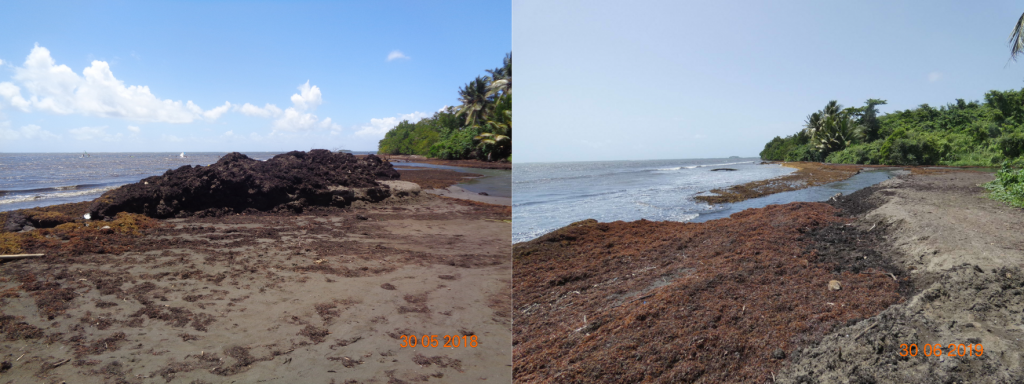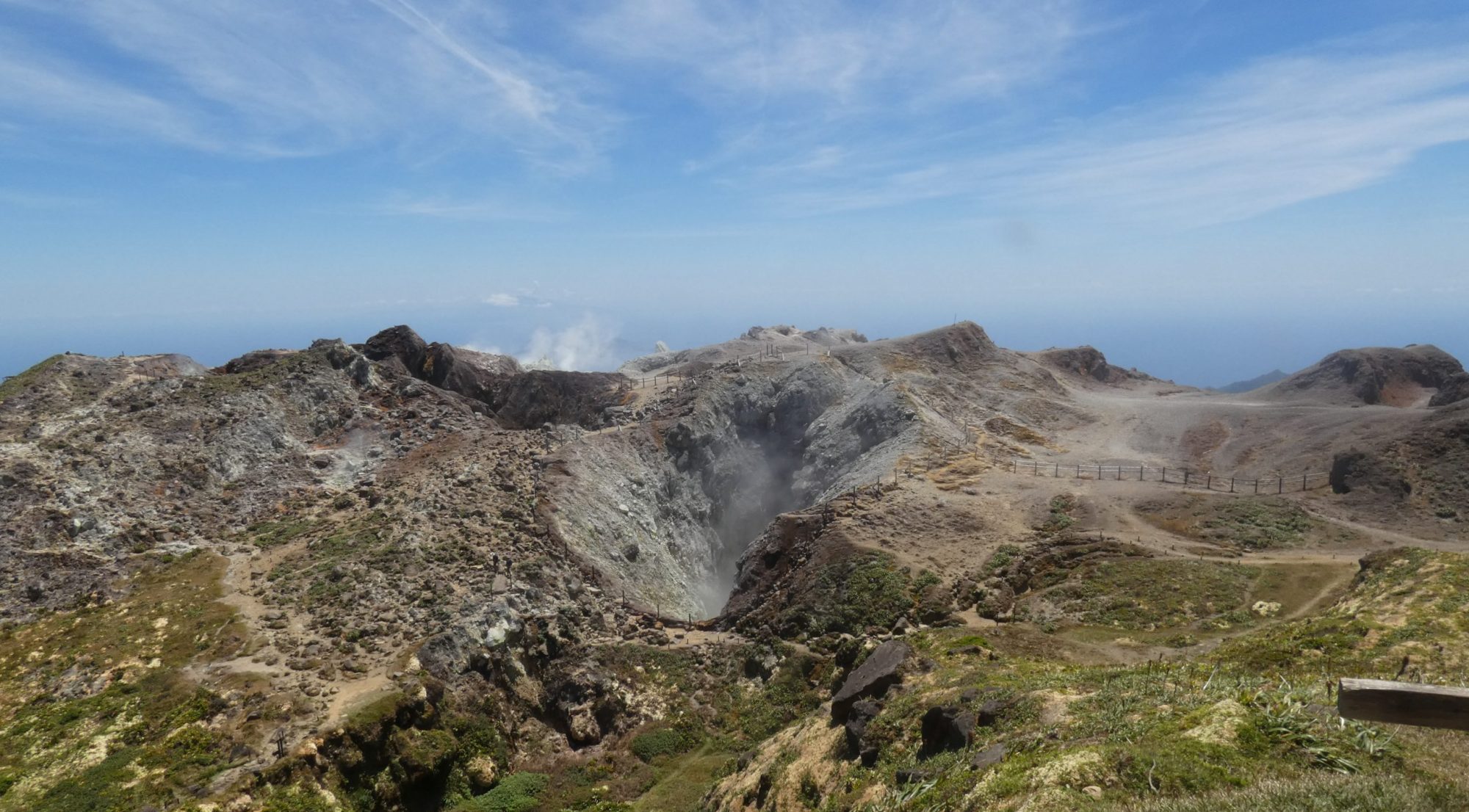
The lexicon around sargassum, the floating brown macroalgae moving under the effect of sea currents, tide and wind which can by decomposing in the absence of oxygen, produce ammonia (NH3) and sulphide hydrogen (H2S) is often always the same, especially from the least precise people and the most hypochondriac and alarmist ones.
Since 2011, massive stranding of stinking sargassum in the Caribbean have blocked ports and made beaches impassable for tourists, a real curse, this invasion is due to Sahara sand, climate change and deforestation in Brazil and West Africa […].
an anonymous journalist
This lexicon comprises false information, misunderstanding of marine processes, and malicious intent towards emerging countries.
But between 2018 and 2019 a word changed causing an upheaval in the perception of Sargassum at the coast, the fear of making a mistake and numerous difficulties both orally and in writing. The word “Échouage” has been replaced in official messages with “Échouement”.
We can wonder if this change in vocabulary is justified and really helps in a better representation of this natural phenomenon. English speakers must understand that both words can be translated by stranding.
First definition
The definition given to the word “échouage” and the word “échouement” by Larousse [www.larousse.fr] is
Échouage, male name
- 1. Contact with the bottom of a stationary vessel, following a lowering of the water level.
- 2. Place where a boat or craft can run aground without danger.
Échouement, male name
- 1. Sudden and fortuitous stopping of a ship in motion, which hits the bottom.
The Larousse website takes care to indicate the uses of these two words:
- “échouage“: the action of deliberately stranding a ship (to repair its hull, for example); the place where a ship can run aground without danger.
- “échouement“: Unintentional stranding.
This first definition suggests that a “échouage” would be voluntary and a “échouement” an involuntary stranding therefore the arrival of sargassum would be accidental, involuntary or even random. This vision is not verified on the ground, the areas of temporary and lasting stranding have been known since 2014 throughout the Caribbean and are still the same. They all correspond to areas where algae, floating plastic and vegetable waste can naturally wash up during low tide, during a period of wind loss or the passage of an anticyclone. In meteorology, the passage of an atmospheric depression or a cyclone produces a rise in sea level known as a surge, conversely, the passage of an anticyclone causes a decrease in sea level.
Second definition
On the website Le Robert (Dico en ligne) one find a second definition:
Échouage, male name
- Situation of a ship which accidentally or intentionally hits the bottom and stops floating. Stranding port, in which ships must beach at low tide (by analogy) cetacean stranding.
Échouement, male name
- Accidental stopping (of a vessel) by contact with the bottom.
This second definition indicates that the term “échouage” corresponds to a voluntary or involuntary action which causes one to stop floating, which is the case of pelagic sargassum algae which ceases to float in certain areas, due to lack of water but also follows the loss of their floaters (pneumatocyst) during its degradation phase. Robert’s definition also associates “échouage” with beaching ports, that is to say, places allowing boats to be dry at low tide, which is the case for many areas impacted by sargassum. We can cite small ports, such as that of Capesterre-Belle-Eau, and mangrove areas such as that of the town of the commune of Goyave.
Third definition
A third reference may be useful to clarify the choice of the term to use. The website of the Centre National de Ressources Textuelles et Lexicales gives us:
Échouage, masculine noun (1674)
- Maritime term: Causes a ship to run aground by accident or on purpose. […]
Échouement, masculine noun (1626)
- Maritime term: Action of beaching a ship; result of this action. (Quasi-)synon. stranding. […]
The two terms are considered almost synonymous, the definitions associate the notion of “échouage” a ship in an area suitable for laying them dry. The term “échouement” seems older than stranding.
What to think
The choice to put the term “échouement” forward came during a period of intense stranding (2018-2019) during which the commitment of the French Government was strongly called into question. The “Plan Sargasse I” had not yet been fully put into action, and the means to support the communities were insufficient. The population was left to its own devices and very angry after more than six years of unfulfilled promises and hopes in various technologies dashed by the reality of the marine environment (Plan Sargasse II). Using an old French term “François” has undoubtedly greatly contributed to alleviating the negative perception of the arrival of pelagic Sargassum algae on the coasts of Guadeloupe and Martinique. The use of an unusual word has disturbed and disturbs more than one person when it is necessary to express their feelings in the face of situations of considerable olfactory, aquatic and visual pollution.
The French language is a language constructed to impose the unity of a set of very diverse nations. Then it was used to build an empire and now to preserve its colonial remains called Francophonie. The fear of spelling or vocabulary mistakes is the ultimate weapon of French people, pushing them to remain silent rather than appearing ignorant or illiterate. It is not a former schoolboy diagnosed with dyslexia who could contradict this reality.
In conclusion
The notion of “échouage” being not false and the fact that it is associated with natural and observable phenomena such as the stranding of whales or fish but also with phenomena of anthropogenic origin such as the stranding of floating waste, my choice is using only the term “échoauge”. I leave the term “échouement” to those who are more concerned with the form than the substance of the problem.
Ultimately, the transition from “échouage” to “échouement” did not improve the situation of populations exposed to the oxygen-free decomposition gases of dead sargassum (fermentation) because of poor quality, insufficiently renewed coastal waters where the untreated sewage is released. It has not improved the condition of sensitive beaches where the collection of dead algae is carried out with a backhoe loader rather than using dynamic methods imitating and respecting nature. It has not improved our management of the coastline, which every day resembles more and more the failure of a neo-colonial empire where knowledge and the right to enlightened initiative seem to accumulate around an oceanic-intellectual gyre centred on Paris.
Jean-François, Marc DORVILLE PhD in Fluid Mechanics, a specialist in Coastal Engineering


